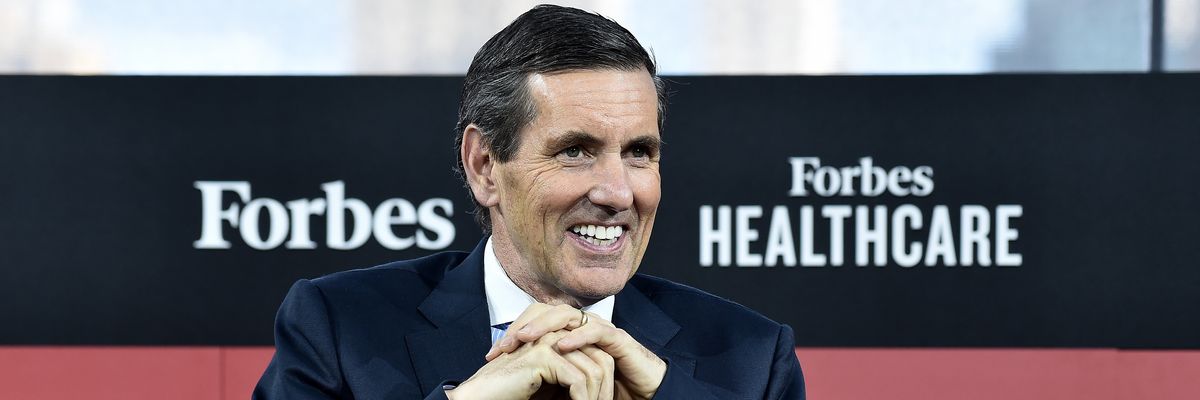The United States' healthcare system is the worst in the developed world, delivering the highest death rates for treatable conditions, the highest infant and maternal mortality rates, and the lowest life expectancy at birth.
But a system that is failing patients, often in catastrophic ways, has been a massive boon for the executives who run the few private companies that dominate the nation's healthcare sector.
Last year, the CEOs of CVS Health, UnitedHealth Group, Cigna, Elevance Health, Centene, Humana, and Molina Healthcare—the top seven publicly traded health insurance giants in the U.S.—brought in a combined $335 million in compensation, STAT recently reported.
The outlet emphasized that "high-flying stock prices again fueled a vast majority of the gains," which mark a new record. Joseph Zubretsky, the CEO of Molina Healthcare—a company whose revenue comes entirely from taxpayer-funded programs such as Medicaid—took home a staggering $181 million in 2022.
As former Cigna executive Wendell Potter noted Tuesday, "these health insurance CEOs have been so successful not because they have improved the health and well-being of Americans, but rather because they have sustained financial returns for Wall Street investors."
"Not much has changed in how insurer CEOs are compensated since I left Cigna in 2008. Except they're making way more," wrote Potter, who is now the executive director of the Center for Health and Democracy.
In a new analysis of the latest CEO pay figures, Potter observed that "had it not been for their companies' share buybacks"—which help boost the price of their stock by reducing the number of shares outstanding—"they wouldn't have banked nearly that much money."
"My analysis of how much the companies have used our premiums and tax dollars to buy back shares of their own stock showed that combined they spent $141 billion on share repurchases between 2007 and 2022," Potter wrote. "Keep in mind that that is $141 billion that otherwise could have been used to reduce our premiums and deductibles–and keep an untold number of American families out of bankruptcy and away from GoFundMe–but was used instead to increase the wealth of their shareholders and top executives."
Potter argued that the CEOs' exorbitant pay packages are "especially alarming when you consider that they are getting more and more of it from us as taxpayers" as tens of millions of Americans go without insurance, struggle to afford their prescription medicines, and drown in medical debt.
In an analysis released earlier this year, Potter estimated that government programs are the source of around 90% of the health plan revenues of Molina, Humana, and Centene.
Centene CEO Sarah London brought in more than $13 million in total compensation last year, and Humana chief Bruce Broussard took home more than $17 million. Both companies are major providers of Medicare Advantage—a privately run, publicly funded, and fraud-ridden program that is a growing source of insurance company revenues.
"Keep all of this in mind the next time you go to the pharmacy counter and are told that even with insurance you'll have to pay a king's ransom for your meds because your insurer—through its pharmacy benefit manager (PBM)—has once again jacked up your out-of-pocket requirement," Potter wrote. "Or the next time you notice how much has been deducted from your paycheck for your health insurance–and Uncle Sam."
Fresh outrage over the pay of insurance industry CEOs, which surged during the coronavirus pandemic as millions lost health coverage and got sick, comes amid a renewed Medicare for All push in Congress.
Last month, Sen. Bernie Sanders (I-Vt.), Rep. Pramila Jayapal (D-Wash.), and others reintroduced Medicare for All legislation in both chambers, with more co-sponsors than ever before—though the bill has no chance of passing the divided Congress.
The legislation would virtually eliminate private health insurance and provide comprehensive care to all for free at the point of service, a transformative change that would likely save tens of thousands of lives and hundreds of billions of dollars each year.
"In America, your health and your longevity should not be dependent on your bank account or your stock portfolio," said Sanders. "After all the lives that we lost to this terrible pandemic, it is clearer now, perhaps more than it has ever been before, that we must act to end the international embarrassment of the United States being the only major country on earth to not guarantee healthcare to all."

